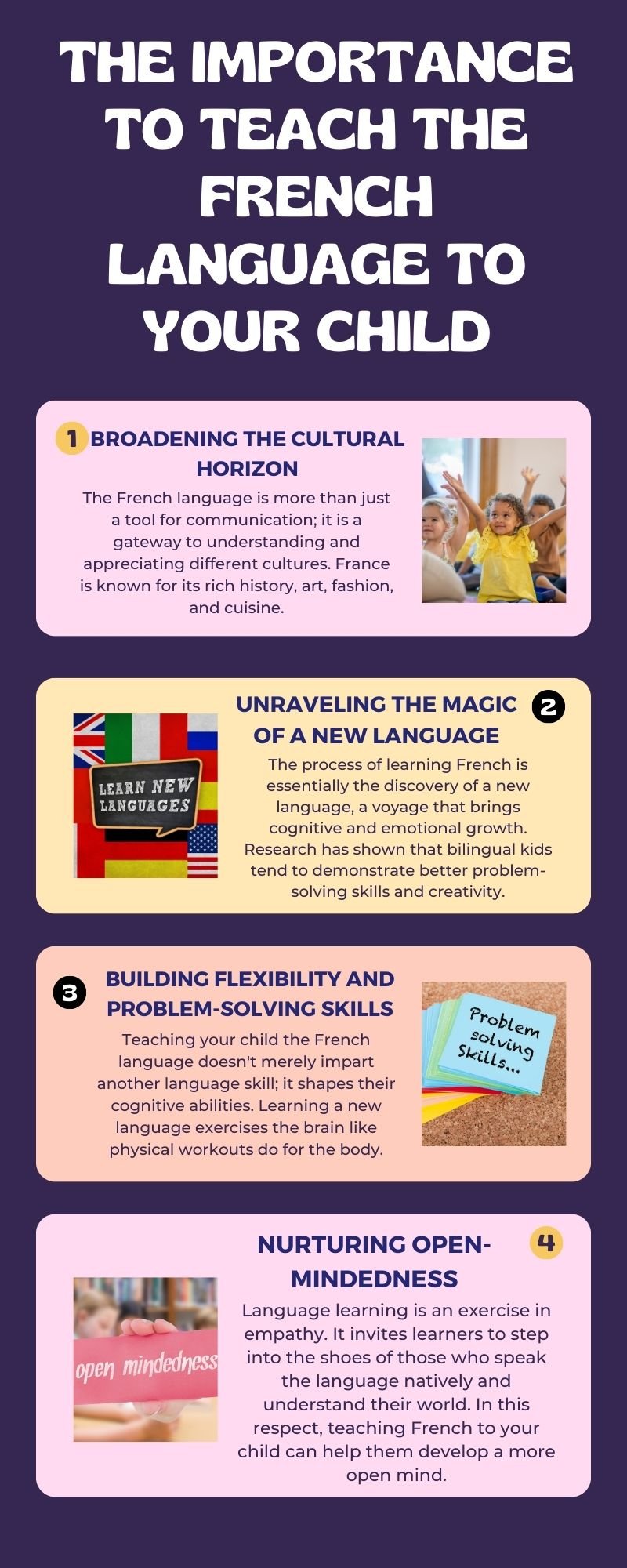Our world is beautifully diverse, adorned with many languages that narrate tales of our shared human history and culture. Among them, the French language holds a unique place. Often described as the language of love, diplomacy, and gastronomy, French introduces us to a rich tapestry of cultural nuances and traditions. Introducing your child to French can open up many opportunities and experiences, enriching their lives in countless ways.
Broadening the Cultural Horizon
The French language is more than just a tool for communication; it is a gateway to understanding and appreciating different cultures. France is known for its rich history, art, fashion, and cuisine. When your child learns French, they become more attuned to these cultural aspects, which may otherwise be inaccessible or elusive. This cultural understanding can enhance their perspective on the world and foster a sense of respect for diversity.
Moreover, the language learning journey involves interacting with French books, which are often imbued with cultural contexts and narratives. Reading French books allows your child to engage with the French worldview, imbuing them with a deeper understanding of another culture. It also encourages children to participate in French book fairs, another cultural exchange platform that simultaneously helps children improve their language skills and learn about French literature.

Unraveling the Magic of a New Language
The process of learning French is essentially the discovery of a new language, a voyage that brings cognitive and emotional growth. Research has shown that bilingual kids tend to demonstrate better problem-solving skills and creativity. French workbooks and lessons, while instilling language skills, also train children to be flexible thinkers.
Additionally, engaging with French teachers offers a supportive environment where kids can experiment with the new language, make mistakes, and learn from them. This interactive process strengthens their critical thinking abilities and provides valuable life lessons about the importance of perseverance and resilience.
Building Flexibility and Problem-solving Skills
Teaching your child the French language doesn’t merely impart another language skill; it shapes their cognitive abilities. Learning a new language exercises the brain like physical workouts do for the body. It is a cognitive task that challenges the brain, leading to greater mental agility. This exercise nurtures flexibility when resolving problems, a skill that can benefit them in every aspect of their lives.

Bilingual kids have been found to possess enhanced multitasking capabilities. This is because their brains get trained to switch between two languages, which improves executive functions like attention control and cognitive flexibility. By engaging in French school lessons or homework, they are inadvertently boosting their problem-solving skills.
Nurturing Open-mindedness
Language learning is an exercise in empathy. It invites learners to step into the shoes of those who speak the language natively and understand their world. In this respect, teaching French to your child can help them develop a more open mind. They learn to see the world from different angles and become more accepting of differences.
In the context of an increasingly globalized world, communicating in multiple languages is an asset and a means of fostering mutual respect and understanding. Your child’s interaction with French teachers and their use of French books and workbooks all contribute to this broader perspective.
The Global Reach of the French Language
French is the fifth most spoken language worldwide and the second most learned foreign language after English. It is an official language in 29 countries spanning different continents, making it a truly global language. It’s widely used in international relations, including the United Nations, European Union, and more. By teaching your child French, you’re offering them the ability to communicate with a vast global community, expanding their personal and, later, professional horizons.
A Latin Foundation for Language Learning
The study of French provides more than the simple mastery of a new language—it sets the stage for an easier understanding and acquisition of other Romance languages, such as Spanish and Italian. These languages, including French, share a common lineage that traces back to Vulgar Latin, the colloquial form of the language used during the Roman Empire.

The structural and linguistic similarities between French, Spanish, and Italian are impossible to overlook. As your child embarks on their journey through the French language, they’ll be introduced to a range of vocabulary, grammatical constructs, and phonetic patterns that will be pleasantly familiar if they later choose to study Spanish or Italian. This foundation can give learners a significant leg up when approaching these languages, making the learning process less daunting and engaging.
The Latin roots embedded in French extend far beyond language as well. These roots have profoundly influenced Western philosophy, law, science, and arts. By learning French, children gain a deeper appreciation for these domains, enhancing their overall educational experience.
French workbooks and lessons often highlight this shared linguistic heritage, offering exercises and content illuminating these connections. For instance, a French lesson may explore cognates—words with a common etymological origin. This exposure strengthens your child’s grasp of French vocabulary and prepares them to recognize similar words if they decide to study another Romance language in the future.
The Joy of French Book Fairs
French book fairs are a celebration of literature and a cultural event that brings together French speakers and enthusiasts. These events offer a platform to discover the latest French books, interact with authors, and deepen their connection with the language and culture. It can be an exciting and motivating experience for children learning French.
By fostering an interest in French books and promoting participation in French book fairs, we can encourage children to practice the language outside the confines of a French school or classroom, thus accelerating their language acquisition while making it a fun experience.
Conclusion
Teaching the French language to your child equips them with much more than a new linguistic skill. It invests in their cognitive development, cultural understanding, and future opportunities. It encourages open-mindedness and flexibility when resolving problems. Being a bilingual kid can be a major asset in our interconnected world. There’s a whole world wrapped up within the French language waiting to be discovered – a world of history, culture, global reach, and personal growth. Introducing your child to French gives them the keys to explore this vast, enriching world.
